Disclosure: WoodAndShop.com is supported by its audience. When you purchase through certain links on our site, we may earn a small affiliate commission, at no cost to you. Learn more.
By Joshua Farnsworth
In the above video I share 10 amazing woodworking shop tours that belong to woodworkers that I’ve had the privilege to visit over the years. And below you can see the full workshop tours of all 10 amazing workshops! These woodworking shop tours will give you a rare look into the wood shop of some famous woodworkers, and give you some wood shop layout ideas to inspire your own woodworking workshop.
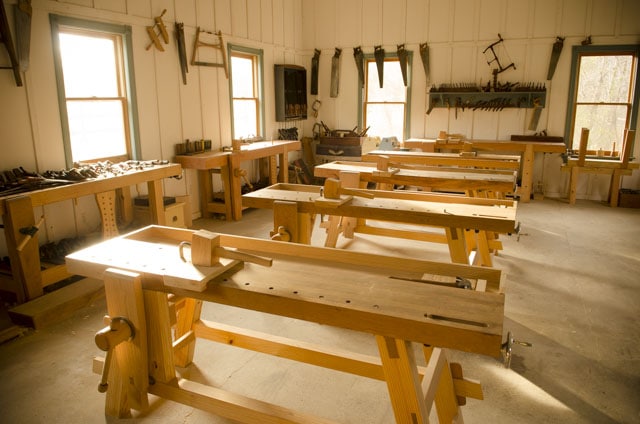
One of the things that I attribute the success of the Wood and Shop community to is that it isn’t just about me. It’s been about many skilled woodworkers who I’ve had the honor to film and visit their workshops and learn from and become friends with. So in the video, and the article below, I’m going to share a quick summary of 10 of my favorite woodworking shop visits. You can also find all of my workshop tours here.
And I’d love you to comment below to vote on your favorite wood shop. Alright, let’s start with the woodworking shop tours!
1. Frank Klausz Woodworking Shop Tour
Our first woodworking shop tour takes us to New Jersey to the workshop of Frank Klausz. Frank is one of the most famous woodworker in the world. This Hungarian woodworker was taught hand tool woodworking by his father behind the communist iron curtain of the former Soviet Union. After immigrating to the United States Frank started his own cabinet making wood shop.
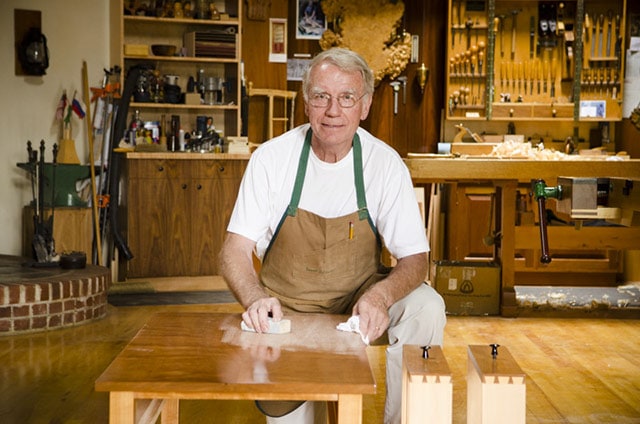
His amazing furniture making skills and fun personality drew millions of people to him through Woodworking videos, books, and magazines. After he retired he built his dream woodworking shop in New Jersey. And he built it inside an old water tank! Frank has a vast collection of woodworking hand tools and power tools, but especially plumb bobs and beer bottle caps. My favorite part of this woodworking shop tour is when he surprised me on camera and said… “thanks for visiting my shop, but I don’t let you go without you cutting me some dovetails!” And then, just like that one video turned into two, and Frank still couldn’t let me go, and wanted me to film a video demonstrating his Monster Molding plane. I certainly didn’t mind! These videos have become some of my most popular, and I hope you watch them so you can learn from this master woodworker. Thanks for the fun day Frank!
2. Bill Anderson’s Woodworking Shop
The next amazing woodworking shop on my list belongs to hand tool expert Bill Anderson. Bill is a woodworking instructor at Roy Underhill’s Woodwright’s School, and also at my traditional woodworking school here in Virginia. Bill’s wood shop sits concealed in the peaceful green wooded mountains of North Carolina. He designed his dream workshop in a way that is both functional and charming. It’s a perfect woodshop layout. He displays his hundreds of incredible antique handplanes and other woodworking hand tools on custom built-in shelves throughout his workshop.
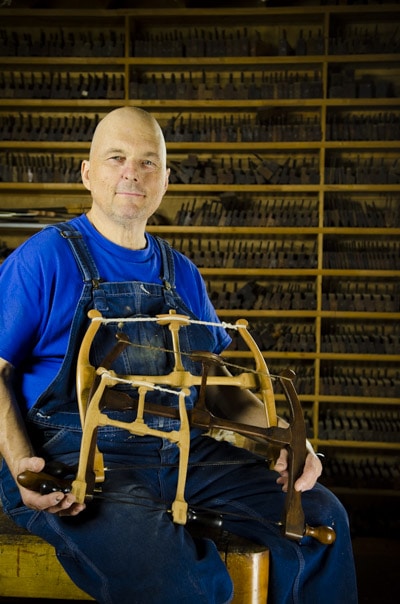
I’m pretty sure Bill knows more about restoring hand planes than anyone in the world. And if you head upstairs, you’ll see some of his furniture projects in various stages of completion, along with many tools and piles of wood that Bill has ready to go for his classes on making hand planes and other woodworking hand tools. I’ve had the pleasure of filming several DVDs with Bill on using, rehabbing, and making different kinds of woodworking hand tools. You can see them here. Thanks for all your inspiration Bill!
3. David Ray Pine’s Woodworking Shop
David Ray Pine is a well-known historical furniture maker and restorationist who works professionally out of his scenic woodshop in the lovely Shenandoah Valley of Virginia. Ray has been featured in Fine Woodworking Magazine and other well-known national publications for his work and skills as a full-time woodworker. Ray’s main focus is on traditional period furniture, but he also has a talent for making any style that his clients request. Ray’s work is absolutely exquisite.
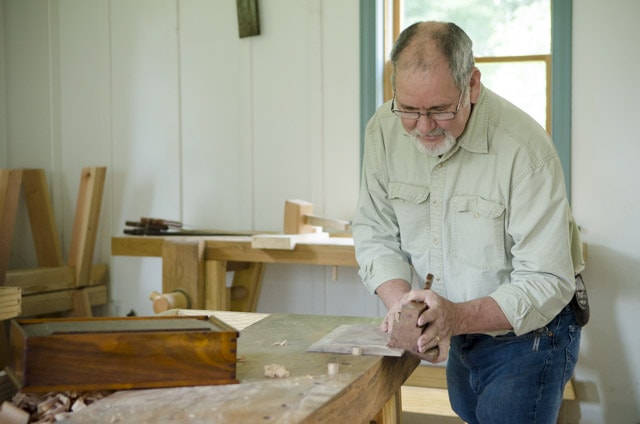
His detailed chair making skill and wood carving ability is what has impressed me the most on my repeated visits to his home and woodworking shop. Ray also uses a good mix of woodworking hand tools and power tools, and acknowledges that even for production work, sometimes woodworking hand tools are still the best choice. Ray’s shop-made historical workbench is the scenic center point of the shop, with all of his woodworking hand tools within reach. But what I was impressed with most were the power tools. In Ray’a wood shop he didn’t have any fancy, large woodworking machinery or tools, and most all date back to at least the 1970’s when he opened his woodworking shop. Yet his furniture is some of the most lovely I’ve ever seen. It reminded me that the tools are important, but they don’t make up for craftsmanship. Aside from his full time job as a professional furniture maker, Ray also teaches at my woodworking school, and the students love him!
4. Wayne Henderson’s Guitar Wood Shop
One of the most unique woodworking shops that I’ve had the honor to visit and film is that of world-renowned guitar maker Wayne Henderson, owner of Henderson Guitars. Wayne’s functional and unassuming guitar-making wood shop is a famous stopping point along Southwest Virginia’s Crooked Road, a pilgrimage route of sorts, for lovers of bluegrass and old-time music. His woodworking shop is adorned with stacks of exotic wood and instruments in various stages of completion, and is anything but tidy.
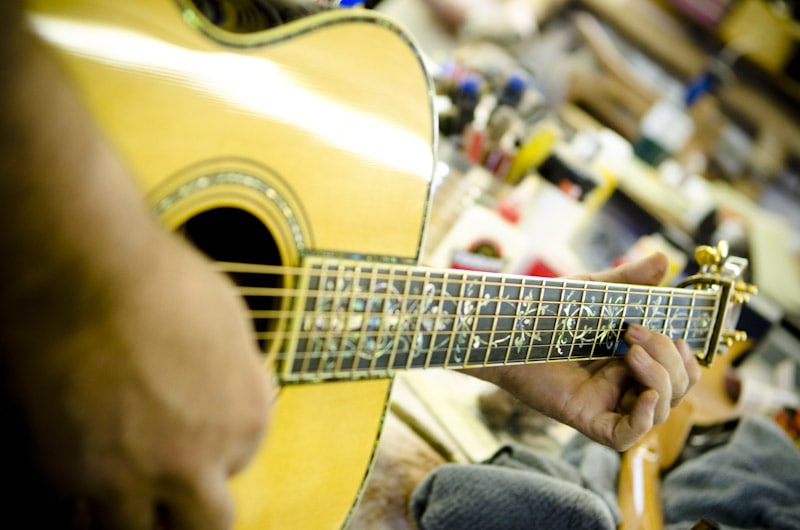
Wayne showed me one of the first guitars that he ever built. He made it out of a cardboard box when he was just seven years old. Over the years Wayne’s guitars have evolved and have become highly sought after. He has made guitars for some of the most famous musicians in the world, including Eric Clapton, Brad Paisley, Doc Watson, and Norman Blake. But as well-known as Wayne is, he sure doesn’t act like it. He’s a quiet and humble man with a humble woodshop, who loves making some of the world’s finest guitars and mandolins. And he intentionally does it on a custom, small scale, non-production way. And what a lot of people don’t know is that he is quite a musician as well. I was awe struck at the rich sound of his guitars and his picking skills on his mandolin. Wayne is truly an American treasure.
5. Don Williams’ Off Grid Wood Shop
Don Williams is the owner of the largest private woodworking shop that I’ve ever been to before. Don is a well-known woodworking writer and instructor who spent his career working as a furniture finishing expert at the Smithsonian museums in Washington DC. But he retired to his dream off-grid farm in the mountains of Highland County, Virginia where he lives in a small chestnut log cabin with his wife. But his property didn’t have a wood shop, so what did he do? He bought a four and a half story timber frame barn on Ebay! This massive structure was disassembled and shipped to his property from several states away, and reassembled as his woodshop and woodworking school.
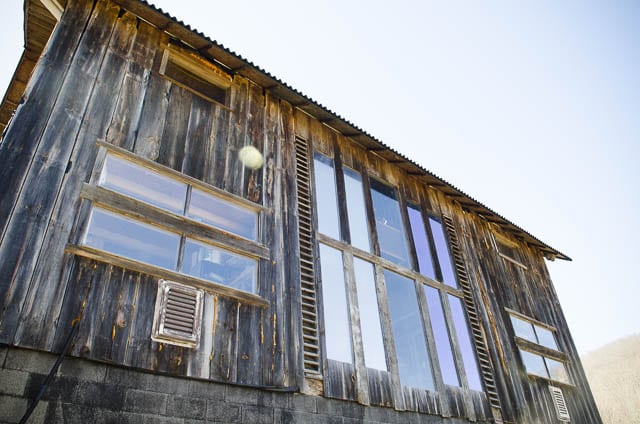
When visiting Don’s woodworking shop I was immediately struck by the scale as I walked through the wooden doors and looked straight up to the timber-framed rafter above. It was like walking back in time. Don’s shop is filled with vintage hand tools, power tools, marquetry and Parquetry projects, wood finishing stations, and a handful of workbenches for his students. His workshop, which he affectionately refers to as “Don’s Barn” is fully off the grid, and runs off of a small hydroelectric generator that’s fed by a small stream. Don’s woodshop layout and overall property were like heaven to a country boy like me!
6. Phillip Lowe’s Furniture Making School
Visiting Phil Lowe’s woodworking school in the charming seaside town of Beverly, Massachusetts was another highlight for me. The historical brick school and woodshop sits within a short walk of the sailboat-filled Beverly Harbor. The Furniture Institute of Massachusetts is a school for woodworking students who want a custom learning experience from a world-class woodworker and teacher. Woodshop classes range from one or two days all the way up to multi-year full time woodworking apprentice programs. Phil has been featured in so many woodworking magazines, books, and videos that it’s hard to name them all. But even more impressive is his skill as a furniture maker.
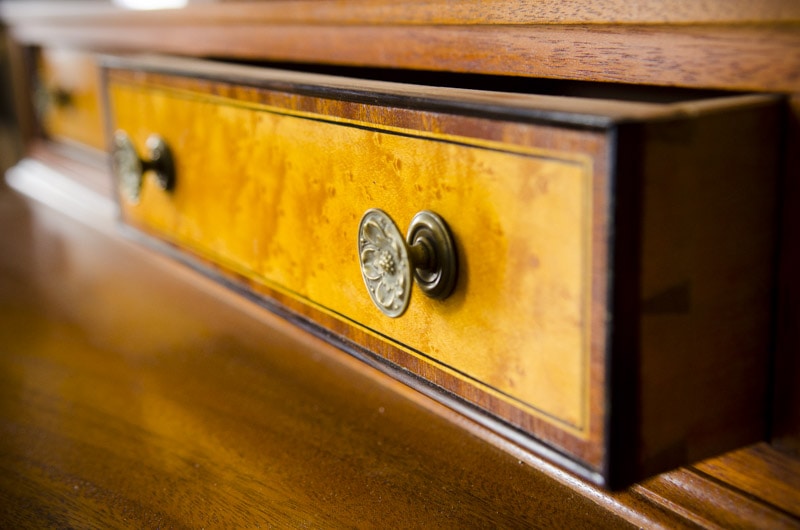
His high-end furniture tells the story of his ability as a woodworker. Phil’s woodworking school has a very comfortable layout. When you first enter the school, if you turn left you enter the design room where students learn how to draw full-sized plans for their furniture. Walking down the hall you enter “the bench room” where all the hand tool work is done. This room is filled with workbenches, with student’s furniture projects, and the walls are filled with vintage and new hand tools. I was like a kid in a candy shop! Moving out of this room you enter the two rooms dedicated to power tools, woodturning, and lumber storage. In this room Phil showed me a historical Marquetry Donkey machine that he built to demonstrate traditional wooden picture making to his students. Visiting this woodworking shop and school was such a fun experience!
7. Elia Bizzarri’s Windsor Chair Workshop
Visitors or students to Elia Bizzarri’s cozy Windsor chair-making shop in North Carolina are first greeted by a simple hanging sign along the road that has a painting of a Windsor Chair. My first visit to Elia’s woodworking shop was when we filmed a DVD on making a continuous arm rocking chair. Elia built his colorful woodshop out in the woods behind his house, and it serves as the spot for his full-time profession as a chair maker and teacher. The historical colors of his school seem to match the sometimes colorful chairs that he makes from logs. As a teenager he used his rough hand tools to build his first workbench, which now stretches almost the whole width of his woodshop.
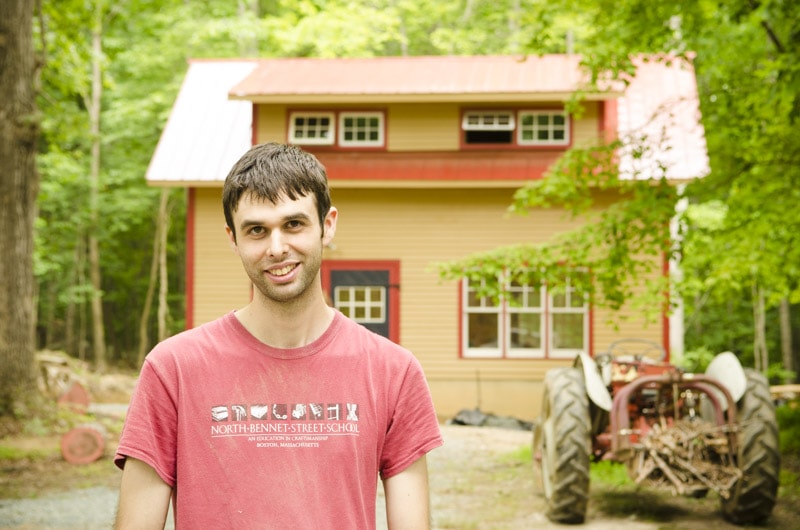
Around that time he also decided that rather than going to college he’d rather learn to be a professional chairmaker. He apprenticed under a well-known Windsor chair maker, and now Elia makes some of the most beautiful Windsor chairs in the world and teaches classes at the prestigious North Bennet Street School and at Roy Underhill’s Woodwright’s School. The main floor of his workshop is heated by a wood stove, and is open to accommodate his classes on chair making and green wood turning. Elia’s enormous lathe and bandsaws are very heavy vintage machines that are built to last. Chair parts and hand tools are scattered across the workbench surfaces and walls, and his shaving horses and wood shavings complete the happy atmosphere. In the woods outside his woodshop is where Elia does a lot of the green woodworking of his operation where he begins the process of turning logs into chair parts. And if you’re lucky Elia might just pull out the guitar he made with guitar making legend Wayne Henderson, who I featured in the video.
8. James Huggett’s Woodworking Shop
James Huggett’s charming workshop sits on the edge of the woods in Earlysville, Virginia, just a few miles from my woodworking school. James started woodworking about 45 years ago while in the United States Navy. About seven years ago, in preparation for his retirement, James built his dream workshop in the woods behind his house, and now works full time building custom furniture for clients along the East Coast. He spent decades designing his dream workshop, down to the smallest detail with the perfect wood shop layout. His designs included large windows & skylights to provide plenty of lighting from multiple directions. Built-in work tables line one of the walls where he does his hand tool work, sharpening, and wood carving.
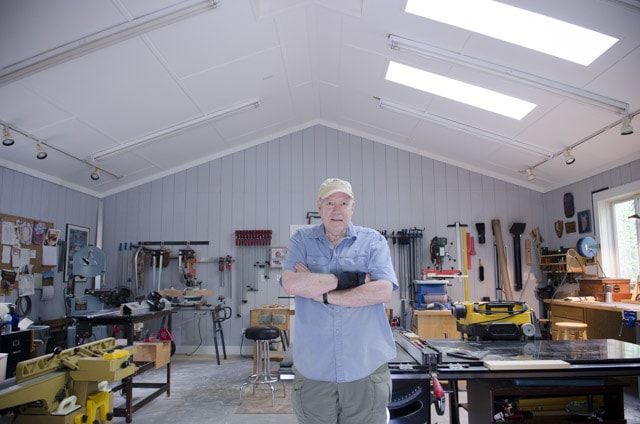
He also has a workbench in the middle area of the shop, along with his machinery. All of the machines are on mobile bases for flexibility on larger projects. His ingenious and highly flexible dust collection hose reaches to any machine, while the dust collector is housed in a back storage area to cut down on noise. One nice touch is the attic fan housed in a cupola on the roof. With the push of a button he can suck dusty or smoky air from the workshop in a matter of a few seconds. Along the other side of James’ shop is his lumber storage area, a shelf full of woodworking books, and his design area. He builds many types of furniture for his clients, but his favorite styles are more aligned with traditional New England furniture, including American antique styles from the Newport, Philadelphia, and Boston families. As you can see, James is a very talented furniture maker, and one of the friendliest people you’ll ever meet.
9. William Brown’s Woodworking Shop
William Brown’s woodworking shop is a hidden treasure in his basement in central Virginia. And William is also a hidden treasure. As a doctor by day and furniture maker by night, William has largely gone unknown in the woodworking world until recently. Over the past several decades he has created some absolutely stunning high-end historical furniture. His work includes lovely case pieces, ornate chess tables, dressers & chests, Windsor chairs, and some of the most intricate tea boxes I’ve ever seen.
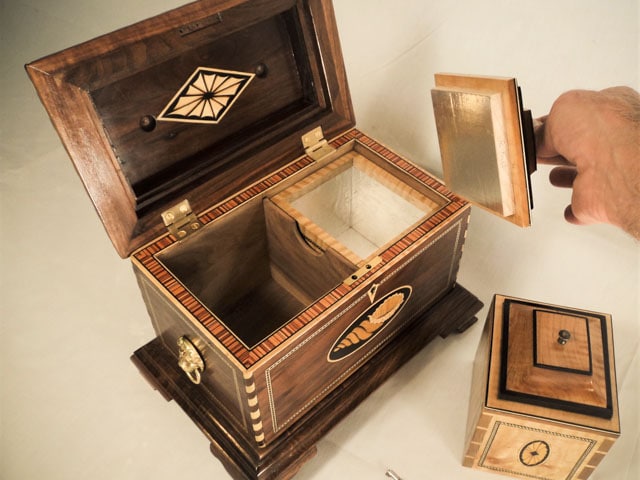
But his real talent is in wood carving. He’s known for his gold-leafed Bellamy Eagles and other animals that adorn stately homes around the country. He has made such a huge volume of high-end furniture that I had to dedicate a second video just to his furniture. Everything in William’s woodshop is in the perfect place, and he has so many well thought out woodworking solutions, tricks, and jigs. I learned so much in just one day! William uses a good mixture of hand tools and power tools. Always the best tool for the job. And last year, right before the pandemic hit the world, William opened his woodworking school, called the Maine Coast Workshop in the lovely seaside town of Camden, Maine. So if you’re going to be up that way, definitely sign up for a woodworking class!
10. Colonial Williamsburg Hay Cabinet Shop
I’ve saved my one of my favorite woodworking shop tours for last: the Anthony Hay Cabinet Shop at Colonial Williamsburg in Virginia. Colonial Williamsburg is the most famous living history museum in the United States, and was one of the capitols of colonial America. Many woodshops dot Colonial Williamsburg, but my favorite is the Hay Cabinet Shop. I received an invitation to film a series of videos by my friend, shop supervisor Kaare Loftheim. Stepping inside the woodshop really does feel like you’re stepping back in time. The shop is an actual working shop that takes commission work from other shops and buildings within Colonial Williamsburg, and all furniture is built entirely in a traditional way, with woodworking hand tools.
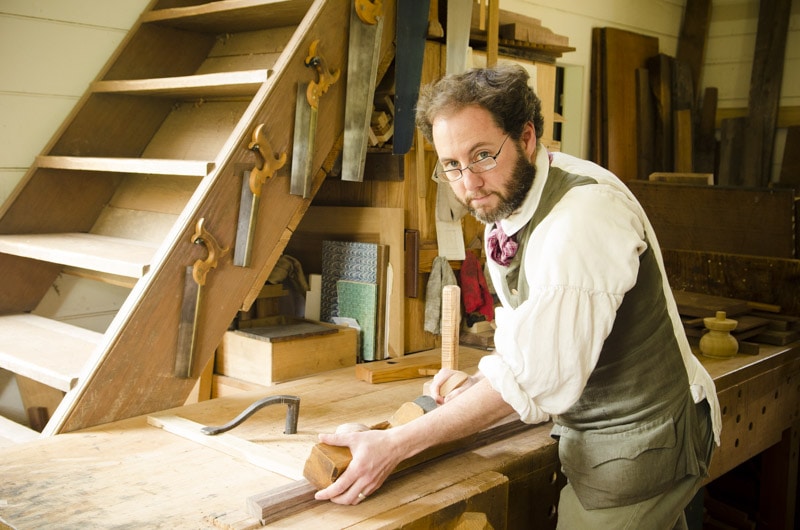
The workbenches, lathes, and hand tools are all 18th century reproduction tools made in a nearby workshop. Edward Write, the journeyman harpsichord maker and Bill Pavlak, the apprentice cabinetmaker demonstrated how they cut veneer with a large frame saw. Apprentice cabinetmaker Brian Weldy demonstrated traditional chair assembly, and also using a treadle lathe to turn a lovely walnut spindle. And finally Kaare showed me how to cut his secret mitered dovetails. You can watch all of these videos here at WoodAndShop.com. This was truly an amazing experience!
Conclusion
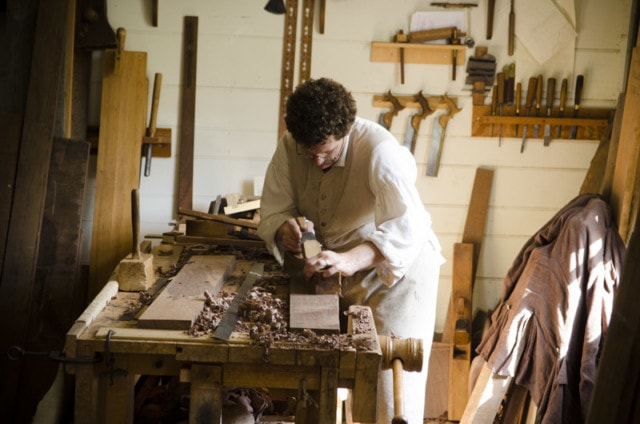
Well I hope you enjoyed seeing these jaw dropping woodworking workshops! So which were your favorites? Please vote in the comment section below. And while you’re down there, please subscribe to my newsletter so you won’t miss my other upcoming videos and articles. I’ll see you next time here in my shop!
TOOL GUIDE SHORTCUTS:

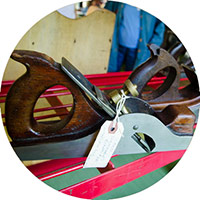
HAND TOOL BUYER’S GUIDES
- Intro to Buying Woodworking Hand Tools
- Workbench & Tool Storage
- Layout, Marking, & Measuring Tools
- Handplanes
- Handsaws
- Chisels
- Sharpening & Honing Supplies
- Mallets & Hammers
- Hand Drills, Braces, & Bits
- Tools for Curved Work
- Tools for Green Woodworking
- Woodworking Clamps, Gluing & Fasteners
- Tools for Wood Carving
- Products for Wood Finishing, Sanding & Scraping
- Wood Turning Tools & Lathes



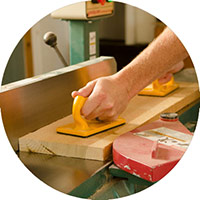
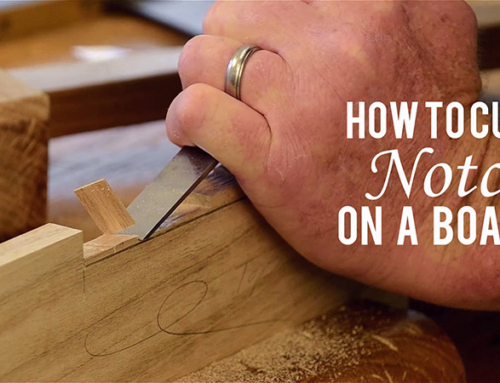
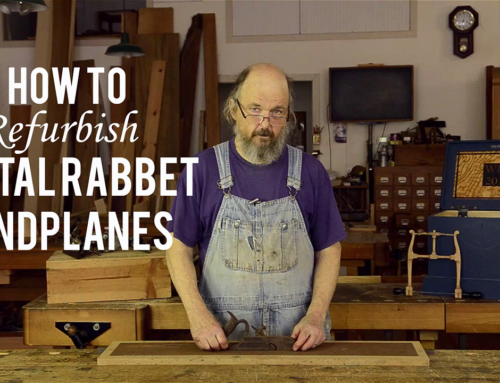
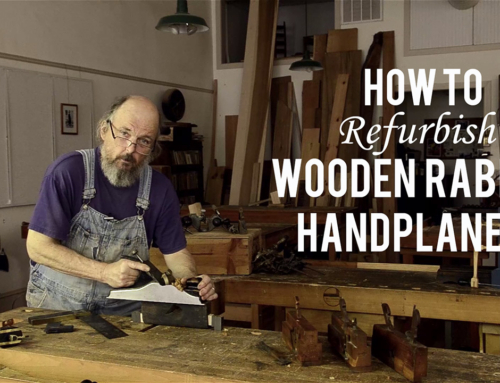
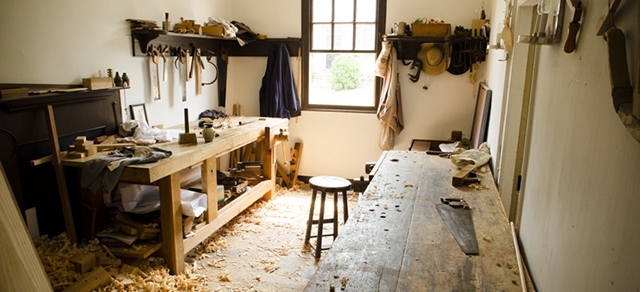
Josh, i liked all 10 shops.
bob
Me too Bob!
I have to say that i am partial to the Hay Cabinet shop in Williamsburg. i have been to Williamsburg countless times and am in the shop every time it is open. i remember a visit when i had just started into woodworking and was asking about how long it took to make a set of Cabriole legs… i was astounded at how short a time it took using hand tools. i do period reproduction furniture in my spare time… Read more »
Yeah, it’s an amazing place Robert!
Even though Phil Lowe has left us, I think his shop, methods and approach to woodworking are at the top. I have been a fan of his for many years. All the rest of the shops are nothing short of first class also.
Sad about Phil Lowe. Glad you enjoyed these tours!
Josh, actually I had seen parts of many of the shops on this tour through videos that I have followed on your website or purchased through you. It is unlikely that I will ever have a shop like any of these, but it is great to walk through them with you and steal an idea here and there for my own humble work area. Thank you (and your guest artisans) for sharing!
Thanks for watching all these tours Gordon! And regarding having your own dream workshop: “Whatever the mind can conceive and believe, it can achieve.” (Napoleon Hill)
Well Josh, I may be on the list (#9), but I vote for Colonial Williamsburg! It gets top marks for aesthetics, IMO.
–Wm. Francis Brown
Maine Coast Workshop
Ha! Yeah, hard to compete with those guys in the Anthony Hay shop.
Hello! Thanks for putting this together for all of us to enjoy! It’s great to see these kinds of places and enjoy the tradition of them, even though they sometimes make you wish your own shop was a little different than it is. I enjoyed all of them very much, but would like to see more of #9’s shop and hear about him. Mister Brown seems like a very talented person who I would like to hear more about
thank you
William Brown’s work is absolutely impressive. Unbelievable how beatiful furniture can be made, I am so amazed about quality of work, beauty and harmony. In terms of the workshops I liked William’s and Phil’s.